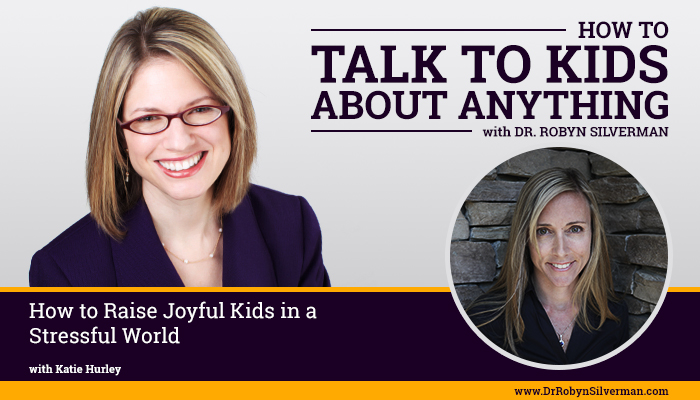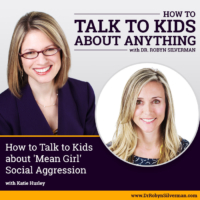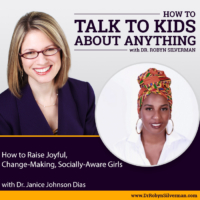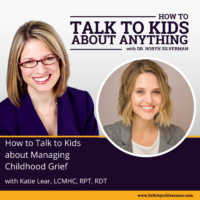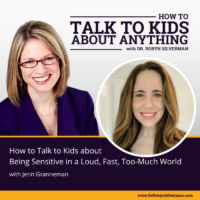Podcast: Play in new window | Download
Subscribe: Apple Podcasts | RSS | More
How to Raise Joyful Kids In a Stressful World
This podcast will focus on how to raise joyful kids in a stressful world. Katie Hurley is noticing more stress in kids these days simply due to everyday pressures. Katie Hurley provides signs to watch for as well as many stress-relievers to encourage from rainbow breathing to play to body mapping and self care. Scripting and examples of empathic listening and reflection are provided.
Special Guest: Katie Hurley
This podcast provides:
- Tips: Katie talks about watching for stress-signs, encouraging play, dealing with differences between parents and children, using empathic listening, using stress words and problem-solving, stop and label, self care, body mapping, deep breathing.
- Scripts: Instead of problem solving, use some empathic listening and reflect back what your child is saying. Examples are given. Also how to talk to kids about pitching in when parents are stressed out (and ask for help when they are!).
- Barriers to success: Differences between how parents and children cope with stress (coming from different worlds).
Important Messages:
- Academics are more stressful. Children are constantly being asked to do things beyond their developmental level.
- There is a pressure to join more activities.
- Kids don’t come home and say; “I’m stressed and overwhelmed.”
- Stress can be manifested in sleep patterns, eating, concentration issues and regression.
- We must know our children’s baseline to know when the stress is impacting them.
- There are many coping skills and stress relief that kids gain from free play.
- When kids invite you into their play world, join them. This will give you great insight into what they are thinking, worrying about and working through.
- Speak out loud about your own stress feelings so that they can hear how to cope.
- We have to remind ourselves to stop, slow down, set limits and do some self care.
- Give a note or “strategy cards” to remind your kids what to do when they are feeling stressed while away from home.
- Anger is external and hot while stress is internal and not as obvious- but calming down techniques can help for both!
Notable Quotables:
- “It’s very difficult to hold it together all day long…but as adults, we have coping strategies. But kids don’t have that. They keep things in check all day long and then come home and fall apart.”
- “Parents often tell me that when their kids turn 8, 9, 10 years old, their kids don’t really need that time for free play anymore. I am always arguing that that’s when they need it the most.”
- “Everywhere kids turn, the expectations are so high right now that they are lacking down time and they need down time. Through the context of play, they can work through these feelings. Kids are really play deprived right now.”
- “Kids work through so many things through the context of imaginary play. Adults have so many emotions about play- they think it’s embarrassing, they have better things to do. Kids have no emotions about play. They find random things and they’re like, “let’s make this into a hotel!”
- “The biggest thing about play is stress relief. It gives them a time to step outside of themselves and work on other things.”
- “When we open up and share our inner dialogue with our kids and then listen to theirs, we can meet in the middle and figure out how to problem solve.”
- “We are living in a busy world right now. It feels like life is on fast-forward. There is always something that needs to be done. So when our kids ask us to do these things, we’re like, I don’t think I can because I have to do ABC. That is a normal reaction but those little things? They’re like windows to their souls. That’s how you can really get to know what’s going on inside.”
- “We need to teach kids and show them that we all have limits and we all need to use our own strategies. You can say; ‘these are the things that help me’ and then ask, ‘what can help you?’
- “If we don’t treat the child as an individual, we may not be meeting them where they are. Everybody has different needs.”
- “Be the first person in the neighborhood to say no, we’re not going to play 3 sports at once. Be willing to take a look at that schedule and be honest about it and say, it all sounds fun but it’s not healthy for our family. We’re going to choose healthiness and being happy. We’re going to slow down even if it feels different from our friends.”
- “I have kids sit on my couch every day of the week and when I ask them ‘what’s your one wish?’ they say; “I wish I had time to play.”
Resources:
Other podcasts that would be of interest, if you loved this one!
Upcoming:
Lori Lite: How to Talk to Kids about Stress Management

